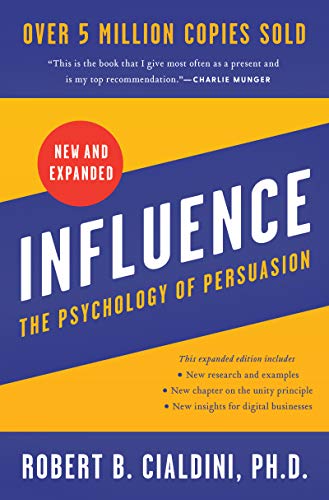
Influence, New and Expanded: The Psychology of Persuasion

reciprocation, liking, and unity for when relationship cultivation is primary; followed by social proof and authority for when reducing uncertainty is foremost; followed in turn by consistency and scarcity for when motivating action is the principle objective.
Robert B. Cialdini • Influence, New and Expanded: The Psychology of Persuasion
Before inviting them to serve as unpaid chaperons on the zoo trip, we asked them for an even larger favor—to spend two hours per week as counselors to juvenile delinquents for a minimum of two years. It was only after they refused this extreme request, as all did, that we made the smaller, zoo-trip request. By presenting the zoo trip as a retreat
... See moreRobert B. Cialdini • Influence, New and Expanded: The Psychology of Persuasion
We have already seen that one consequence of the rule is an obligation to repay favors. Another consequence, however, is an obligation to make a concession to someone who has made a concession to us. As my research group thought about it, we realized that was exactly the position the Boy Scout had put me in. His request that I purchase some $1
... See moreRobert B. Cialdini • Influence, New and Expanded: The Psychology of Persuasion
Reciprocation. Concession. What would this look like for fundraising at KMI?
Not only was the family of the college student made to feel indebted by the help he received, but had they been able, they could have retired the debt, as research indicates, by helping a member of the nurse’s family (Goldstein et al., 2007). Additional research shows that this kind of group-based reciprocity extends to mistreatment. If we are
... See moreRobert B. Cialdini • Influence, New and Expanded: The Psychology of Persuasion
In short, problem-free may not feel as good to people as problem-freed.
Robert B. Cialdini • Influence, New and Expanded: The Psychology of Persuasion
Isn’t it interesting that had the resort stocked those additional two children’s racquets from the outset—in order to ensure its guests a “seamless experience”—their availability would not have been seen as a notable gift or service that warranted special gratitude and loyalty in the form of additional business? In fact, the racquets may have
... See moreRobert B. Cialdini • Influence, New and Expanded: The Psychology of Persuasion
It wasn’t guests with an errorless stay who reported the highest satisfaction ratings and future loyalty. Rather, it was those who experienced a service stumble that was immediately put right by the hotel staff.
Robert B. Cialdini • Influence, New and Expanded: The Psychology of Persuasion
Perhaps Reverend Jones’s mistake was in teaching the Scriptures too well to Ms. Louie, especially Exodus 23:8—“And thou shalt take no gift; for a gift blindeth them that have sight and perverteth the words of the righteous.”7
Robert B. Cialdini • Influence, New and Expanded: The Psychology of Persuasion
Despite the impressive force the rule of reciprocation commands, there is a set of conditions that magnifies that force even more: when the first gift is customized, and thereby personalized, to the recipient’s current needs or preferences.